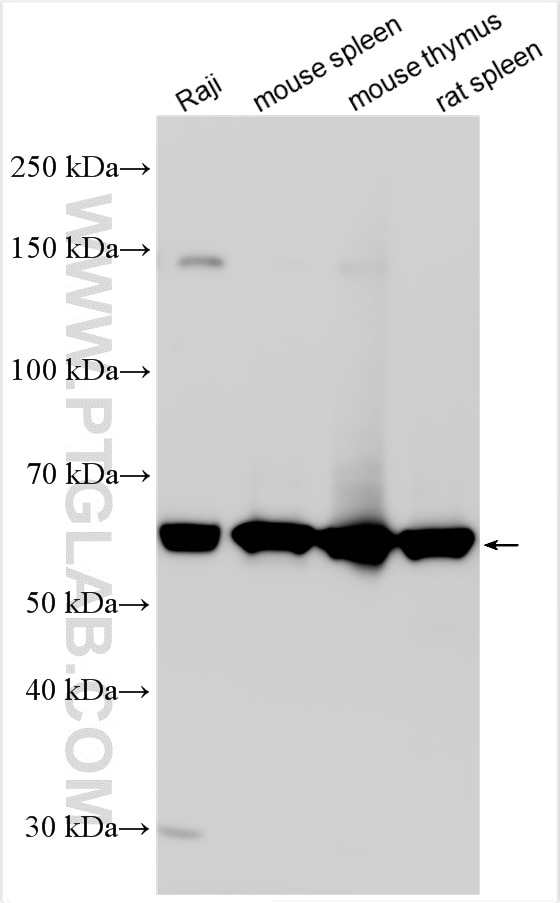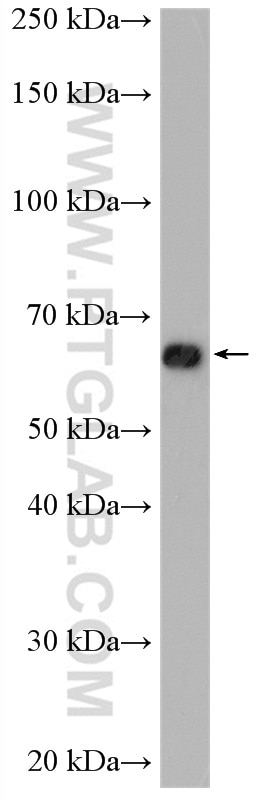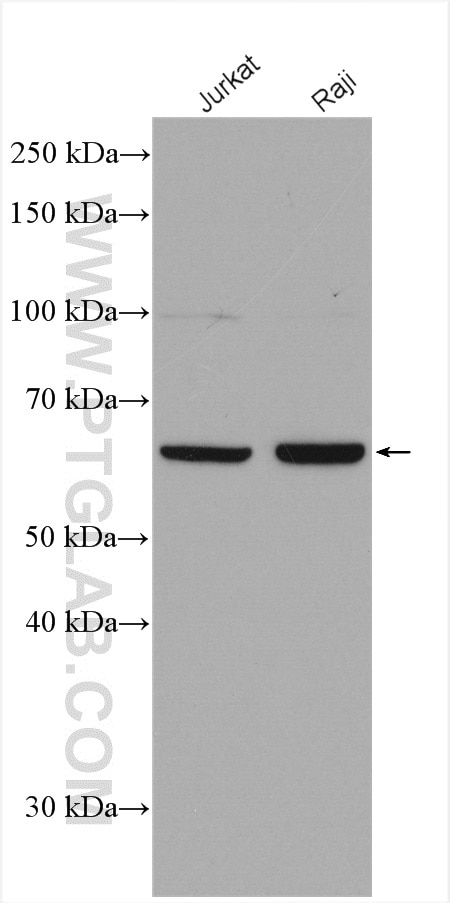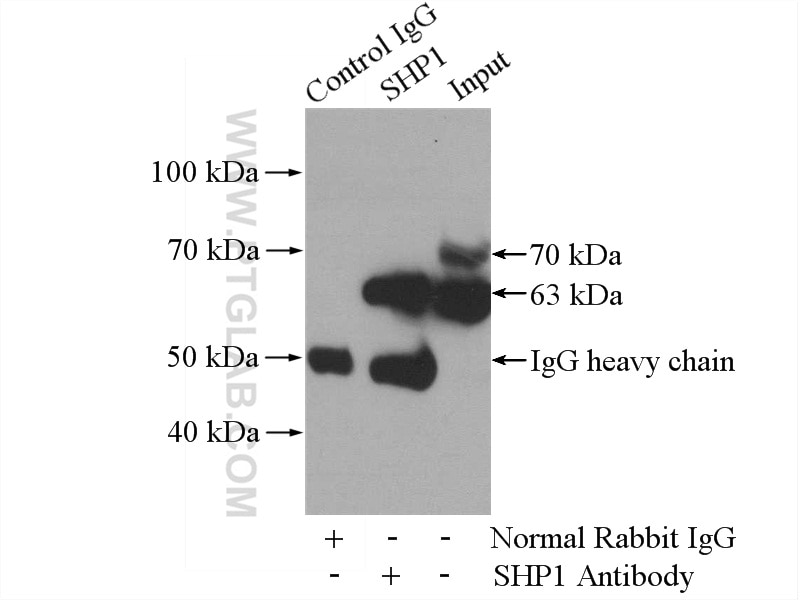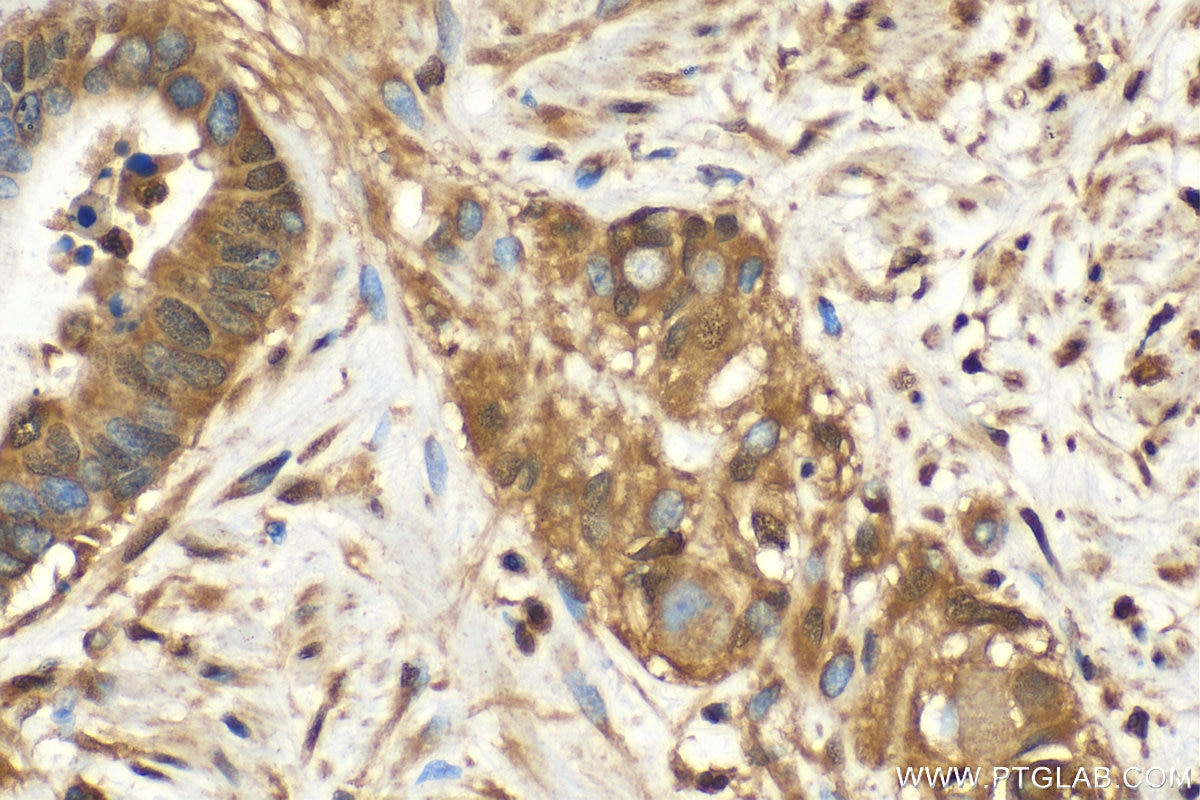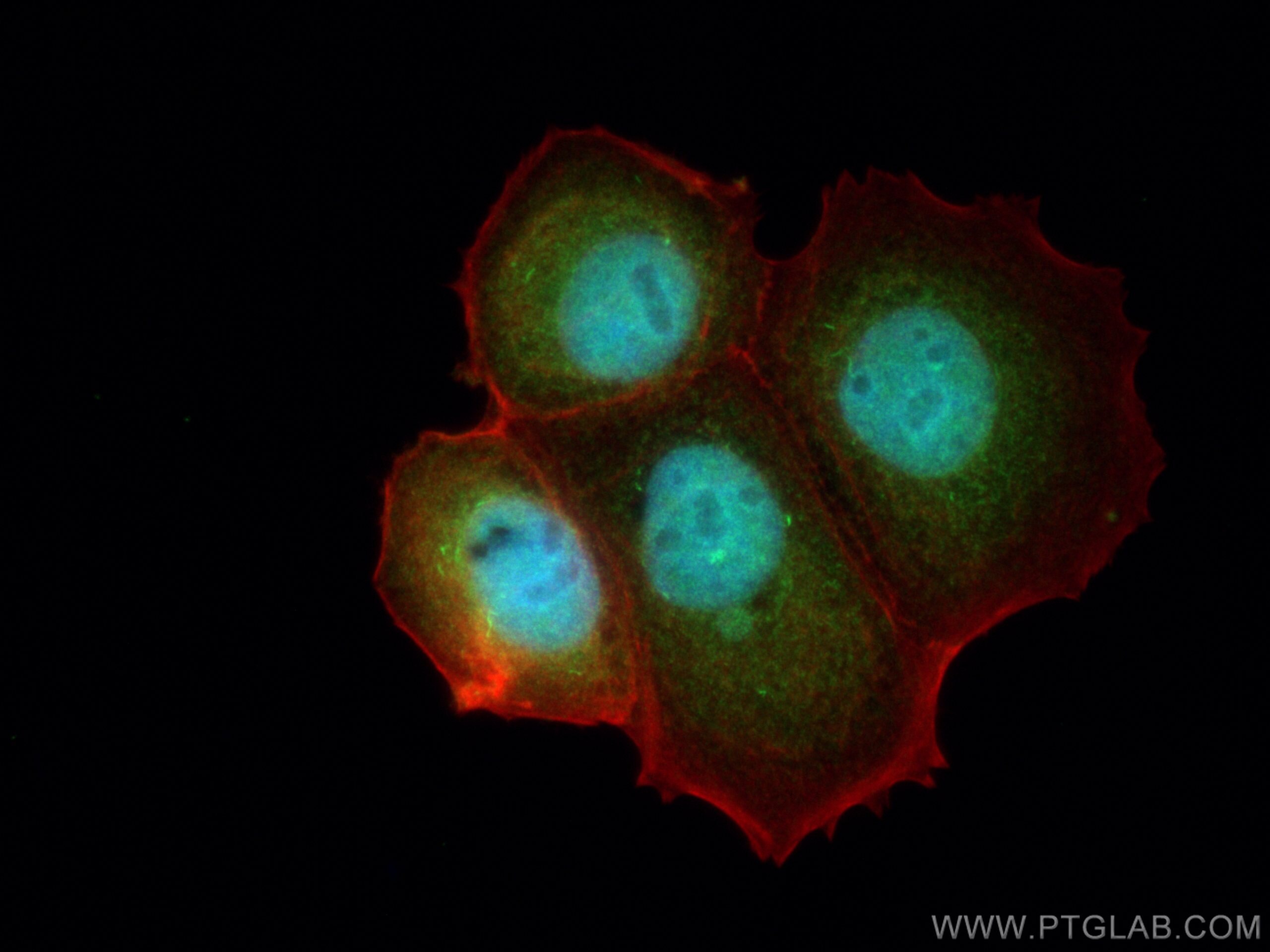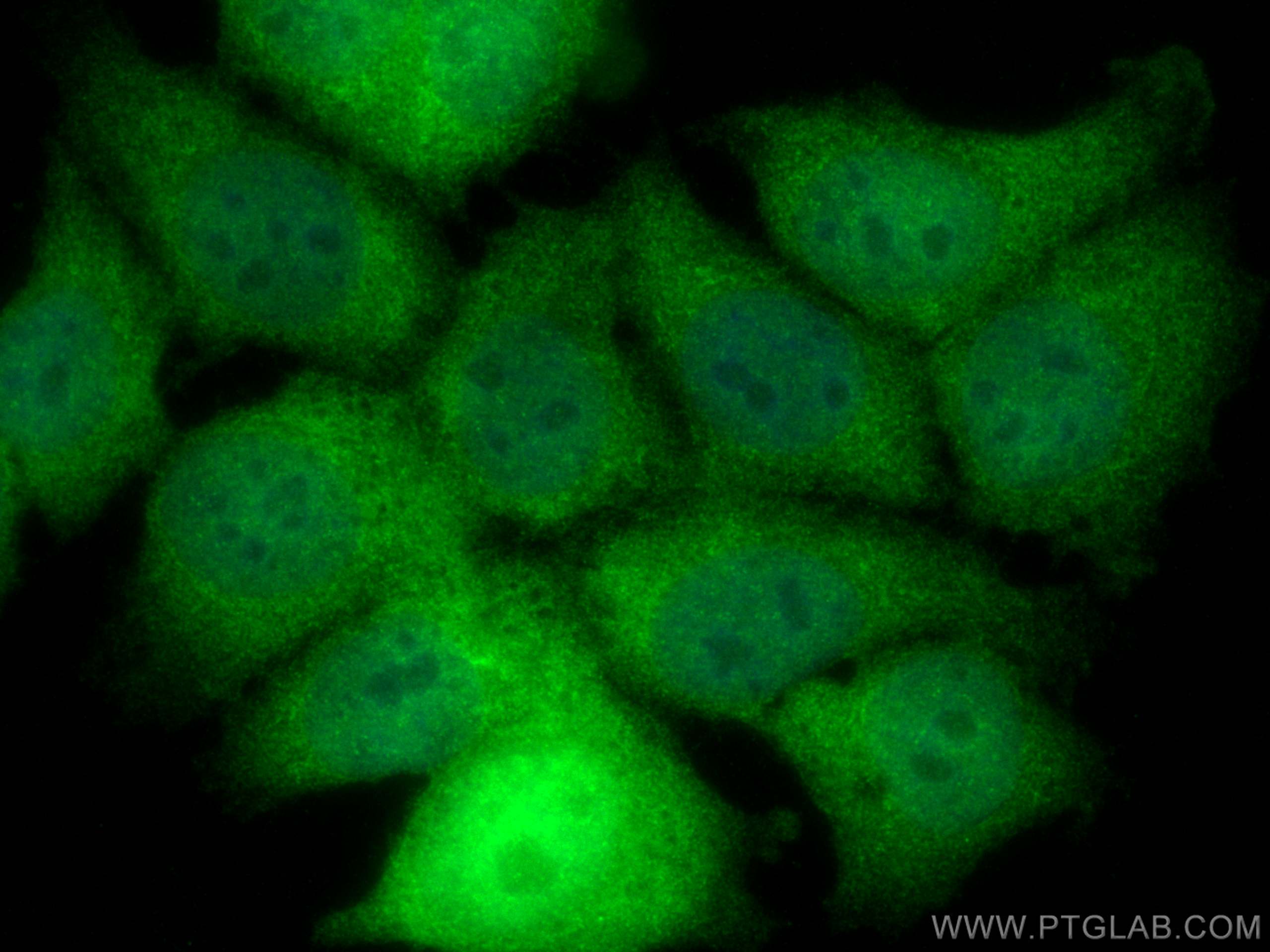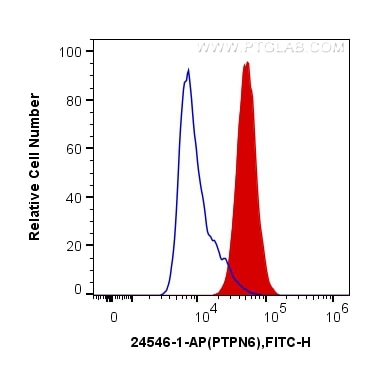Validation Data Gallery
Tested Applications
| Positive WB detected in | Raji cells, Jurkat cells, HuH-7 cells |
| Positive IP detected in | Jurkat cells |
| Positive IHC detected in | human colon cancer tissue Note: suggested antigen retrieval with TE buffer pH 9.0; (*) Alternatively, antigen retrieval may be performed with citrate buffer pH 6.0 |
| Positive IF/ICC detected in | MCF-7 cells |
| Positive FC (Intra) detected in | MCF-7 cells |
Recommended dilution
| Application | Dilution |
|---|---|
| Western Blot (WB) | WB : 1:5000-1:50000 |
| Immunoprecipitation (IP) | IP : 0.5-4.0 ug for 1.0-3.0 mg of total protein lysate |
| Immunohistochemistry (IHC) | IHC : 1:50-1:500 |
| Immunofluorescence (IF)/ICC | IF/ICC : 1:50-1:500 |
| Flow Cytometry (FC) (INTRA) | FC (INTRA) : 0.20 ug per 10^6 cells in a 100 µl suspension |
| It is recommended that this reagent should be titrated in each testing system to obtain optimal results. | |
| Sample-dependent, Check data in validation data gallery. | |
Published Applications
| KD/KO | See 1 publications below |
| WB | See 17 publications below |
| IHC | See 1 publications below |
| IF | See 2 publications below |
| IP | See 2 publications below |
| CoIP | See 2 publications below |
Product Information
24546-1-AP targets PTPN6/SHP1 in WB, IHC, IF/ICC, FC (Intra), IP, CoIP, ELISA applications and shows reactivity with human, mouse, rat samples.
| Tested Reactivity | human, mouse, rat |
| Cited Reactivity | human, mouse |
| Host / Isotype | Rabbit / IgG |
| Class | Polyclonal |
| Type | Antibody |
| Immunogen |
CatNo: Ag21415 Product name: Recombinant human PTPN6 protein Source: e coli.-derived, PET28a Tag: 6*His Domain: 506-598 aa of BC002523 Sequence: QYKFIYVAIAQFIETTKKKLEVLQSQKGQESEYGNITYPPAMKNAHAKASRTSSKHKEDVYENLHTKNKREEKVKKQRSADKEKSKGSLKRK 相同性解析による交差性が予測される生物種 |
| Full Name | protein tyrosine phosphatase, non-receptor type 6 |
| Calculated molecular weight | 597 aa, 68 kDa |
| Observed molecular weight | 63 kDa |
| GenBank accession number | BC002523 |
| Gene Symbol | PTPN6/SHP1 |
| Gene ID (NCBI) | 5777 |
| RRID | AB_2879600 |
| Conjugate | Unconjugated |
| Form | |
| Form | Liquid |
| Purification Method | Antigen affinity purification |
| UNIPROT ID | P29350 |
| Storage Buffer | PBS with 0.02% sodium azide and 50% glycerol{{ptg:BufferTemp}}7.3 |
| Storage Conditions | Store at -20°C. Stable for one year after shipment. Aliquoting is unnecessary for -20oC storage. |
Background Information
PTPN6(Tyrosine-protein phosphatase non-receptor type 6) is also named as HCP, PTP1C and belongs to the protein-tyrosine phosphatase family. It regulates muscle INS action in a cell-autonomous manner, further suggesting that the PTPase negatively modulates INS action through down-regulation of both INS signaling to AKT1 and SLC2A4 translocation, as well as SLC2A4 expression(PMID:21952243). It has 4 isoforms produced by alternative splicing.
Protocols
| Product Specific Protocols | |
|---|---|
| IF protocol for PTPN6/SHP1 antibody 24546-1-AP | Download protocol |
| IHC protocol for PTPN6/SHP1 antibody 24546-1-AP | Download protocol |
| IP protocol for PTPN6/SHP1 antibody 24546-1-AP | Download protocol |
| WB protocol for PTPN6/SHP1 antibody 24546-1-AP | Download protocol |
| Standard Protocols | |
|---|---|
| Click here to view our Standard Protocols |
Publications
| Species | Application | Title |
|---|---|---|
Elife Molecular features underlying differential SHP1/SHP2 binding of immune checkpoint receptors. | ||
Oncotarget Dietary quercetin potentiates the antiproliferative effect of interferon-α in hepatocellular carcinoma cells through activation of JAK/STAT pathway signaling by inhibition of SHP2 phosphatase. | ||
Front Immunol Host MKRN1-Mediated Mycobacterial PPE Protein Ubiquitination Suppresses Innate Immune Response.
| ||
Oxid Med Cell Longev Proscillaridin A Promotes Oxidative Stress and ER Stress, Inhibits STAT3 Activation, and Induces Apoptosis in A549 Lung Adenocarcinoma Cells. | ||
J Biol Chem A thiazole-derived oridonin analog exhibits antitumor activity by directly and allosterically inhibiting STAT3. |

